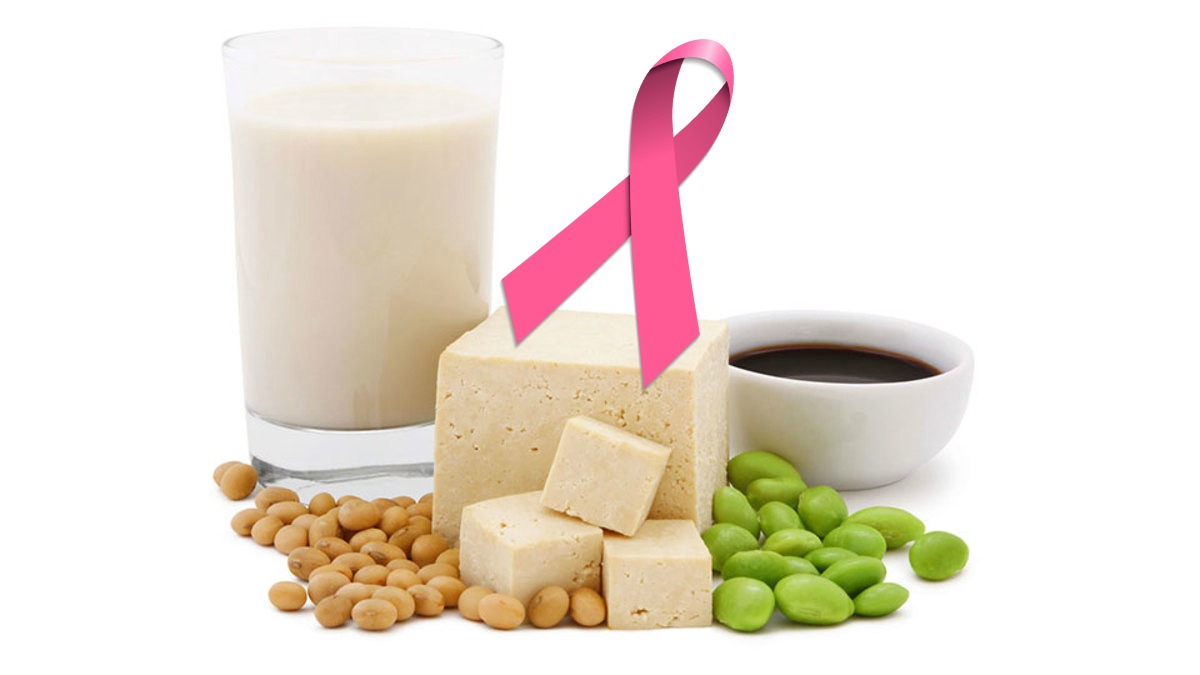Many women are concerned about soy over fears it may increase their risk of breast cancer or increase risk of recurrence after a breast cancer diagnosis.
Soy contains a high amount of isoflavones. Isoflavones belong to a group of substances called phytoestrogens which are plant chemicals with a similar structure to the hormone estrogen. Estrogen can attach to certain breast cells to turn on cancer growth. Because estrogen can fuel certain types of breast cancer, many women are afraid to consume soy or have heard that they shouldn’t eat soy foods.
But, plant-based estrogen is not the same as the hormone estrogen. Hormonal estrogen is only in animals. Plant estrogens cannot turn on the cells to the same degree that hormonal estrogen can. Plant estrogens can actually be protective against breast cancer by blocking cell receptor sites.
Long-term human observational studies have shown that women who regularly eat soy have a lower risk of breast cancer than those who do not eat soy. According to the American Institute for Cancer Research (AICR), “Consistent findings from population studies indicate no increased risk for breast cancer survivors who consume soy foods. In fact, limited evidence shows potential for greater overall survival, and perhaps decreased recurrence, among women a year or more after diagnosis who include moderate amounts of soy.” (Soy: Intake Does Not Increase Risk for Breast Cancer Survivors – https://www.aicr.org/cancer-prevention/food-facts/soy/)
Another potential benefit of soy food intake is the lessening of some common side effects after breast cancer treatment. These side effects include menopausal symptoms (hot flashes, night sweats), fatigue, cognitive changes (memory loss, difficulty concentrating), and hair thinning / loss. Having hormone therapy after breast cancer treatment may contribute to or make these symptoms worse. One study found that higher soy and cruciferous vegetable intake (such as broccoli and cauliflower) was associated with less treatment-related menopausal symptoms and fatigue. (Breast Cancer Res Treat. 2018 April; 168(2))
Soy is a great plant-based source for protein and contains potassium, magnesium, and fiber. Soy intake has also been shown to protect heart health. Heart disease remains the number one cause of death for men and women in the United States and is also a potential complication from some cancer treatments. Studies show eating soy can cause a 4 to 6 percent drop in LDL cholesterol (particularly among people with elevated levels) and has the potential to reduce blood pressure in people with hypertension by promoting relaxation of blood vessels. These effects are linked with daily soy food intake.
The bottom line is that women can safely consume a moderate amount of soy foods, which is about 2-3 servings a day. Soy foods are a healthy option, while soy supplements may not be. Research on soy and breast cancer has looked at soy foods, not supplements. If you choose to include soy in your diet, choose healthy, whole soy foods such as tofu, tempeh, soymilk, and edamame. Soy pills and isoflavone-enriched powders should be avoided.
Some examples of a serving of soy are 1 cup of soy milk, 1/3 cup of tofu or ½ cup edamame. I particularly like edamame on a salad along with nuts or seeds and fruit for a hearty plant-based lunch. Tofu can also be used in place of meat in foods like chili, spaghetti sauce, and even burgers. Tofu on its own is rather bland, but a wonderful vehicle for other flavors. Try it in a stir-fry or vegetarian chili for a high protein, plant-based meal.
Forge is delighted to partner with Laura Rutledge, MA, RDN, CSO, a Registered Dietician Nutritionist who focuses on oncology nutrition for Cooking with Laura focuses on nutrition during and after cancer diagnosis and treatment. For more information and recipes from Laura check out Nourishing Plate. All images courtesy of Nourishing Plate. You can find additional blogs from Laura on Forge’s blog!
